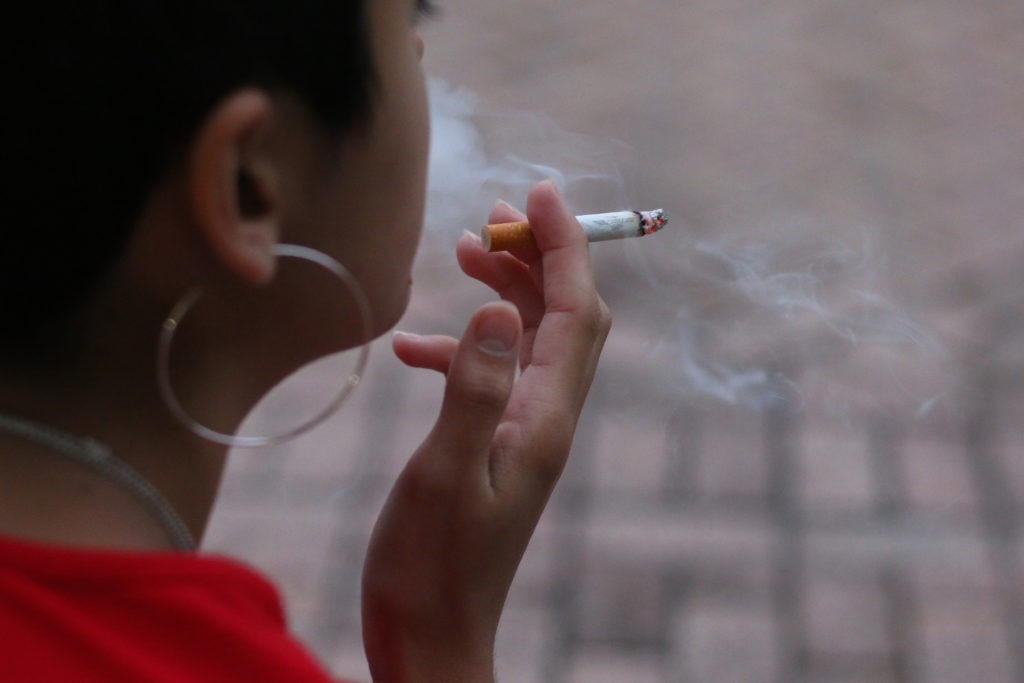Officials tout the University’s status as a “smoke-free campus,” but students say few GW Police Department officers enforce the ban – especially in an era of increasing e-cigarette use.
In interviews, more than 10 students, who spoke on the condition of anonymity for fear of retribution from the University, said that each time they’re caught smoking by GWPD officers on University property, they face no penalties. At most, GWPD officers ask students to step on the sidewalk, which is public space where students can smoke, they said.
Officials said since the University implemented a smoking ban in 2013, GWPD officers are required to explain the policy to students smoking on campus and ask that a student move to a public space. For some on-campus locations, moving to a public space could mean moving just feet away – like from the benches in front of Thurston Hall to the sidewalk or down the steps outside of Duques Hall.
University spokeswoman Maralee Csellar said that smoking any tobacco product, including cigarettes, cigars and e-cigarettes, is banned on GW property. If a GWPD officer sees someone smoking on University property multiple times, the officer will refer them to human resources or Student Rights and Responsibilities, she said.
“We are proud to be a smoke-free campus that works to creates a healthy environment for our campus community as they learn, visit and work on our campuses,” Csellar said in an email.
She declined to say how officials make students aware of the ban and how many students were disciplined for smoking on campus last academic year and this year.
Students who smoke on campus said they disregard the policy because the consequence for smoking on campus does not stretch beyond a verbal warning from GWPD officers.
One freshman smoking outside Francis Scott Key Hall said GW’s no-smoking policy does not deter him from smoking because “GWPD doesn’t care.”
“I see the no-smoking signs everywhere, but no one cares,” he said. “The professors smoke on campus too. What are they going to do?”
One law student said that when he was asked to put out his cigarette outside Bell Hall by a GWPD officer, he refused and asked the officer to show his badge. The officer eventually walked away, allowing him to smoke, he said.
Students who smoke e-cigarettes on campus said that GWPD officers have never confronted them about the smoking ban, and some said that they were not aware e-cigarettes were included in the policy.
“It’s good to have a policy on that,” a student using a Juul outside of Duques said Monday. “I haven’t really seen them enforce it ever, so it’s probably more of a deterrent than anything.”
Another student said he understands why smoking cigarettes is banned because it is “more of a health hazard,” but e-cigarettes should be re-evaluated until they are proven to be detrimental to others’ health.
A student smoking an e-cigarette outside of the Science and Engineering Hall said it would be “difficult” to enforce such a ban on an urban campus.
Higher education experts said universities should more forcefully implement smoking bans by indicating explicitly where students can and cannot smoke on campus and instituting more severe punishments, like fines.
John Banzhaf, a public interest law professor, said that for the University to fully enforce the smoking ban, students should be informed about what kinds cigarettes are included in the ban and where they are permitted to smoke using better signage around campus.
“It is a little bit hard to start talking about cracking down and enforcement if the University doesn’t do a fair job of advising people, putting them on notice and probably better training their police,” Banzhaf said.
He added that most students likely know about the policy, but it is possible that students are unaware that e-cigarettes are included in the ban. There is no reason the penalty for smoking an e-cigarette should be different than smoking a traditional cigarette because people can still be affected by their exhaust, Banzhaf added.
Ryan Holmes – the associate vice president of student affairs at the University of Miami, one of GW’s peer schools – said Miami has struggled to enforce its own smoking ban because repeated offenders continue to smoke without serious consequences.
The University of Miami reduced the number of designated smoking spaces by 50 percent in 2012 and became a smoke-free campus in 2013. The university is considering implementing a fine for offenders who are caught multiple times, but officials are still discussing the policy, he said.
Holmes said the policy applies to anyone on campus – including visitors – but that any “punitive measures” apply only to students, faculty and staff. On-campus visitors who are smoking can be confronted and told to stop smoking, he said.
“The sentiments we’re getting so far is that the majority of the people on the campus want the campus to be free of smoke,” Holmes said. “We believe that the policy and the enforcement of the policy are the way to support the masses here who want to live healthier lives.”
Lizzie Mintz contributed reporting.



